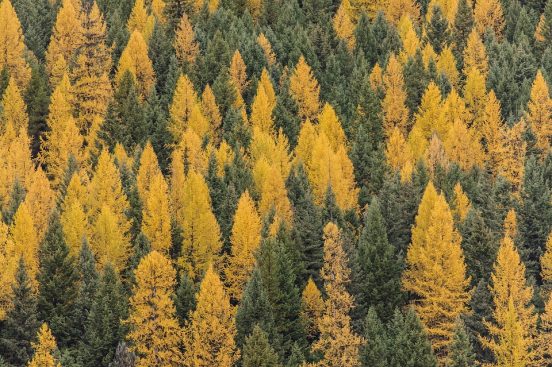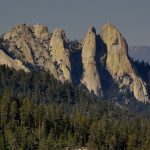This interview was conducted over the phone on Wednesday October 19th, 2016, shortly after Vancouver author John Vaillant (“The Golden Spruce”) and German author Peter Wohlleben (“The Hidden Life of Trees”) presented at the 2016 Vancouver Writers Festival.
~
John, thanks for taking the time to talk. I have a list of ten questions; the first half are about forests and our relationship to the natural world and the second half are more personal. If any question is too general or too personal, let me know and we’ll move on to the next.
Q: In your eyes, is the decline of old growth forests a widely understood issue?
A: No. Excessive clear-cut logging of old growth forests is under-publicized and the public is largely unaware of problems associated with it.
Q: Do you believe we can be re-awakened to the importance of our relationship to forests through their beauty or do there have to be more extreme measures in order for us to realize the consequences of deforestation?
A: I do not recommend extremist actions in this case because I don’t see them as effective. I do think the best way for us to be reminded of our connection to forests is through direct exposure, by experiencing a forest first hand and turning it into a personal investment.
Q: How bad does the situation need to get before the general public recognizes a need for change?
A: Hopefully not much worse. We are at a point now where the consequences of our choices will continue even after we make significant changes to the way we live. We have set something in motion that is beyond our ability to control, we have created a momentum of destruction, turning the world into a sort of battery that will continue to circulate excess heat long after we stop raising the temperature.
Q: How do we begin to harmonize with nature again?
A: Books like Peter Wohlleben’s “The Hidden Life of Trees” are crucial contributions to public knowledge. His book re-affirms the link between humans and the systems that support them. Companies like the one that employs you run by business leaders who are conscious of environmental problems and enthusiastic about finding solutions to them are also key.
When we look at the lives of indigenous persons we see them live and die according to their ability to coexist with nature—modern society attempts to insulate us from that.
This sort of monster was released in the ‘60s and ‘70s with the rapid advance of sciences and technologies which attempted to control nature—something that is beyond our ability. I personally advocate for a “humbling”, a recognition of what is and is not within our control.
We have moved past the point where individual effort is a significant enough contribution. You can drive an electric car, consume environmentally friendly foods and have the most energy efficient house, but in comparison to the rate at which we as a species are degrading our environment the personal effort just isn’t enough. I would say that there is a need for a more unified approach. Also, an opportunity for great change lies in a transition to renewable energy.
Q: When did you start planning “The Golden Spruce”? Did you begin with a clear mental image of the finished product or did the idea develop as you worked on it?
A: I first heard about the golden spruce on a kayak trip around the southern end of Haida Gwaii in 2000. Someone told me the story of the tree, which had been cut down for 3 years by then, and it interested me. I started asking questions like “who would want to cut down a tree like that?” and “why?” and each question led to more questions. I collected my findings and composed an article which was published in the New Yorker in 2001, then expanded my findings into a book.
Q: Do you have any background working in the natural resources industry?
A: I was raised in New England, I’m comfortable running a chainsaw, but I was only awakened to the harsh reality of clear cutting when I moved to BC.
Q: Do you have any opinions on the upcoming U.S. election?
A: I think the chickens are coming home to roost for the Republicans. The party sowed their own destruction from the ‘60s into the ‘80s when they began targeting marginal white America. Treating the entire U.S. population as if they fit into this narrow category is unrealistic; similar to climate change, there were warning signs which the party chose to ignore. The resulting unrest has escalated into ugly conflicts across the country and the Republicans’ extremist policies have taken the form of Donald Trump. Things are coming to a head in the western political and ecological spheres and I hope there will be some soul searching done by natural resource executives and political leaders alike.






nagar
December 18, 2021 — 5:44 am
Join this best website and easily to get the more about for the Colours game Join the Colours thanks for the developed this game.
Bettilt
September 16, 2022 — 3:42 am
A plataforma de jogo Bettilt vem com um design avançado de website com um tema púrpura escuro com inclusões amarelas. A combinação de cores é perfeita, especialmente para a interface feita profissionalmente. Além disso, Bettilt apresenta um layout simples com secções agradavelmente adicionadas.
geometry dash
October 3, 2022 — 10:55 am
Melville, Thoreau, Dickinson, and Emerson are part of this really lovely literary legacy in New England. There is a lot of literary excellence. So, there is undoubtedly a strong appreciation for writing in the society in which I was raised.
tiny fishing
March 30, 2023 — 9:56 pm
I really love The Golden Spruce. That’s a masterpiece!
lily lily
April 20, 2023 — 8:05 pm
I was so impressed by your article bitlife – you really did your research and it shows. I learned so much from reading it!
coysdfos
April 24, 2023 — 4:36 am
Not everyone can crack a software yasir252 office because doing that requires a lot of … that both dUP2 and the patcher created by it are free from virus.
Emo Band
May 3, 2023 — 11:19 pm
I really love The Golden Spruce. That’s a masterpiece…!
Hazel
June 24, 2023 — 7:14 am
You can customize the frequency with which TiviMate Premium updates the EPG (electronic program guide). download
Connections
July 17, 2023 — 9:14 pm
I have read this interview, they share very interesting things. The interview method is also very comfortable and close
Paulo
July 18, 2023 — 8:45 am
Very cool story, I liked the way it was written and how it was presented to the reader, very good, as good as the fact that I get help with writing papers online, it’s something incredible, how lucky I am to have found this wonderful service that saves me every time we are assigned some difficult written work. They are real magicians who can write a paper of any complexity and do it in a way that will blow your mind, so if you need help with your writing, don’t hesitate to contact them.
Free iPhone
October 5, 2023 — 8:23 am
A free government iPhone 13 is available to low-income families as well as households that get public assistance, such as Medicaid, SNAP food stamps, SSI, section 8 or that have an EBT card. A number of companies provide free smartphones, including Assurance Wireless, Q Link, SafeLink (Tracfone) and others.
henry smith
August 9, 2023 — 4:37 am
your post was very helpful to me
henry smith
August 9, 2023 — 4:37 am
Thanks for such a pleasant post. This post is loaded with lots of useful information. Keep it up.
sara
September 28, 2023 — 5:18 am
Download Old Music BY : Mahyar And Deon | Ghab With Text And 2 Quality 320 And 128 On Music-fa
yahya
September 28, 2023 — 5:20 am
Mohammad Noori – “Aroosi” > Old Song > Download With Text And 320 & 128 Links In Musico.ir
Lauryfriese
October 5, 2023 — 12:12 am
Candy Crush is known for its addictive and visually appealing gameplay, with bright and colorful graphics that create a visually stimulating experience for players. The game’s challenging levels, wide variety of candies, and strategic thinking required to achieve high scores make it a highly engaging and entertaining game for players of all ages.
James Webb
October 5, 2023 — 8:20 am
TiviMate Premium IPTV comfortably tops our list of best IPTV players for obvious reasons. The IPTV player comes with a long list of features as well as a simplified pricing structure.
SoPlayer
October 5, 2023 — 8:21 am
SO Player will load the content from the IPTV service and showcase an easy-to-navigate interface. The SO Player branding is at the top and you can see the TV, Movies, Catch up, EPG, and more at the bottom. You can go to the menu and check the content on offer.
Allen
October 8, 2023 — 11:28 pm
The Splunk SPLK-1003 Exam Questions PDF is a certification test designed to assess your knowledge and skills related to the Splunk Enterprise platform. Aspiring Splunk professionals and administrators often seek this certification to validate their expertise in using Splunk for data analysis, monitoring, and troubleshooting. In this exam, you will encounter a series of questions and answers that cover a wide range of topics and concepts associated with Splunk.
Dorry Levis
October 18, 2023 — 1:39 pm
To achieve the desired level of persuasiveness, students hire professional writers to get help from those who have proven experience with academic writing.
hally john
November 14, 2023 — 6:55 pm
Start Fishing like there’s no tomorrow!!!, Once you reach a certain distance inside the corridor, the level will automatically rise up. https://tiny-fishing.co/ There are lots of missing platforms inside, and you should jump over them or walk on the sides to rotate the whole corridor.
Run 3
November 14, 2023 — 6:56 pm
When I’m in a bad mood, I like to play games https://runaway3d.com/ since they are entertaining, and afterward, I always feel better about myself. If you’ve never done so, you should give it a go at least once.
bitlife
November 27, 2023 — 6:28 pm
Vaillant believes we can learn from indigenous peoples, who have lived in harmony with nature for centuries. He argues that modern society has attempted to isolate us from nature and this has led to a loss of connection with the natural world.
Tina
December 23, 2023 — 2:48 am
Looking for a best IPTV player? TiviMate Premium IPTV comfortably tops our list of best IPTV players for obvious reasons. The IPTV player comes with a long list of features as well as a simplified pricing structure.
Linda
December 23, 2023 — 2:50 am
You know what a free 5g government phones from government is available to low-income families as well as households that get public assistance, such as Medicaid, SNAP food stamps, SSI, section 8 or that have an EBT card. A number of companies provide free smartphones, including Assurance Wireless, Q Link, SafeLink (Tracfone) and others.
Laura
December 23, 2023 — 2:50 am
If you want access to Free iPhone Government, there are two programs you must know about — the Lifeline Assistance Program and the Affordable Connectivity Program (ACP). Through these programs, carriers can provide their customers with free smartphones, and if you’re lucky, an Apple iPhone.
WatchParty
December 27, 2023 — 3:05 am
Wer liebt es nicht, zusammen Filme und mit einer Watch Party eigene Erinnerungen zu schaffen? Sie können jetzt ihre Lacher,Emotionen und Momente mit Funktionen wie Chat, Audio- und Videoanrufen teilen. Es ist die beste Erweiterung, mit der Sie Spaß haben können.
Armanunderpin
December 27, 2023 — 4:06 am
Your conversational style in the interview made it feel like I was eavesdropping on an engaging dialogue between two enthusiasts. I appreciated how you dug into not just the technical aspects of his writing but also the personal motivations and challenges he faced. It’s like you’re peeling back the layers of the author to reveal the human behind the literary genius.
Armanunderpin
December 27, 2023 — 4:21 am
It was fascinating to learn about the inspiration behind his writing, especially the influence of nature and the connection between humans and the environment. The way he delves into the complexities of human-animal relationships is truly thought-provoking. Your interview showcased not just his literary prowess but also the genuine passion he has for the subjects he explores.
youtube to mp3 converter
December 28, 2023 — 11:52 pm
Excellent work! This work demonstrates your hard work and inventiveness. Keep up the fantastic job, and I hope to see more of you in the future.
With Youtube to MP3 converter, you can convert all your favorite YouTube videos into MP3.ytmp3 is a user-friendly extension and the best part is it is free to use. So, from now onwards you can enjoy music not only online but offline also. Stream your best shows anytime and anywhere.
Spotify Ad Blocker
January 1, 2024 — 11:31 pm
Outstanding effort! Your effort and creativity can be seen in this work.
Spotify ad blocker is the ultimate solution that allows you to enjoy your favorite tunes without those disturbing ads interrupting your music streaming experience on Spotify, So it’s time to say goodbye to those annoying ads that break the rhythm of your playlists.
Anabel Gomez Lopez tamales
January 1, 2024 — 11:33 pm
Great job! Your effort and creativity shine through in this work. Keep up the good work, and I look forward to seeing more from you in the future.
Anabel Gomez Lopez tamales committed a cruel crime of selling human flesh on Mexican streets and she confessed her crimes of killing so many people. Most of her victims were young women. After her heinous and cruel crime she was sentenced for 25 years of prison.
Factstalks
January 1, 2024 — 11:36 pm
Excellent work! This work demonstrates your hard work and inventiveness. Keep up the fantastic job, and I hope to see more of you in the future.
Factstalks- Explore a universe of varied perspectives! Our blogging platform provides interesting information on a wide range of subjects, including science, culture, technology, and lifestyle. Discover knowledgeable viewpoints, perceptive essays, and provocative writings written by committed authors. With our extensive selection of engaging blogs, join the discussion and expand your perspective.
rice purity test
January 9, 2024 — 9:35 pm
To bring the in-play action to life, educational toys like Osmo combine tactile play pieces with a device’s camera.
real iqtest
January 18, 2024 — 6:00 am
Curious about your intelligence level? Try the authentic IQ test to discover your true smarts! Designed with scientific principles, this quiz offers a precise assessment of your intellectual capabilities.
Online Dictionary
January 19, 2024 — 1:16 am
Free Internet-based word encyclopaedia. What are you looking for? Wiki Wordy is a free online dictionary and thesaurus with a simple interface, complete inflections, auto-suggest, frequent updates, a browsable index, support for mobile devices and millions of external reference links for definitions, audio, and etymology.
CompTIA CompTIA A+ Certification
January 31, 2024 — 11:38 pm
DumpsWrap offers CompTIA CompTIA A+ Certification Core 2 Exam real exam questions and practice test engine with real questions and verified answers. Try CompTIA A+ Certification Core 2 Exam exam questions for free. You can also download a free PDF demo of CompTIA CompTIA A+ Certification Core 2 Exam exam. Our CompTIA A+ Certification Core 2 Exam Combo Package for which includes PDF (Printable Format) and Testing Engine (Works on Windows and MAC) which ensures you to go through all certification topics and provides you ultimate satisfaction to pass your exam in your first attempt.
Netflix party
February 8, 2024 — 10:44 pm
I love how John Vaillant emphasizes the importance of immersive research in storytelling. It’s inspiring to see an author delve so deeply into their subjects, bringing a richness to their narratives. Makes me wonder, how do other writers approach research for non-fiction works?
youtube ad blocker
February 9, 2024 — 1:39 am
Kudos to the author for making a potentially dry subject so engaging! I especially loved the use of [humorous anecdote or metaphor] to explain a complex idea. It not only made me chuckle but also helped me grasp the concept better. More of those, please!
Netflix watch party
February 9, 2024 — 3:45 am
I enjoyed reading this interview. Vaillant’s journey from journalism to fiction is inspiring. It makes me curious about other authors who have made similar transitions. Do you have any stories or insights from authors who switched genres in their writing careers?
Netflix watch party
February 9, 2024 — 3:46 am
This interview has given me a newfound appreciation for the connection between literature and the natural world. It would be great to see more content exploring how authors use their words to evoke a sense of place. Any plans for future articles along these lines?
Baddies East
February 21, 2024 — 2:17 am
Your content is nothing short of brilliant in many ways. I think this is engaging and eye-opening material. Thank you so much for caring about your content and your readers.
curtains
February 29, 2024 — 4:38 am
Nice article.
curtains
February 29, 2024 — 4:39 am
Love this article.
reginaedward
March 2, 2024 — 2:59 pm
Free Government iPhone is now in everyone’s reach through Lifeline and ACP.
Melon
March 22, 2024 — 8:45 pm
I have always been drawn to storytelling and Melon Playground the power of language to convey ideas and emotions. Growing up surrounded by nature also instilled in me a deep appreciation for the natural world, which has heavily influenced my writing.
Von Arroyo
April 16, 2024 — 7:54 am
The author’s expertise shines through in this blog. It’s clear they have in-depth knowledge on the subject. Fascia Services
Web Lint
May 22, 2024 — 9:18 pm
This interview with John Vaillant is incredibly enlightening, offering deep insights into his creative process and the motivations behind his work. Truly inspiring for both readers and aspiring writers!
HarlanAllam
June 11, 2024 — 7:49 pm
The ‘Serial’ podcast’s gripping storytelling kept me hooked from start to finish.
https://lafontanacitta.com/blog/hardees-breakfast-hours/
Aadhar Card
June 11, 2024 — 11:10 pm
I am really very happy to visit your blog. Now I am found what I actually want. Thanks a lot for sharing a piece of wonderful information which I am looking for for a longer period of time.
UIDAI Aadhar Card Check
RIT
Typing Speed
June 11, 2024 — 11:21 pm
This is a great post. I like this topic. This site has lots of advantages. I found many interesting things on this site. It helps me in many ways. Thanks for posting this again.
Online Typing Tests
RIT
Scholarship Portal
June 11, 2024 — 11:23 pm
nice your blog thank you so much for sharing this information.
Jnanabhumi Scholarship Status Check
RIT
Data Entry
June 11, 2024 — 11:26 pm
Well done! It is one of the very informative blogs I have come across. You have a flair for writing and have fine knowledge of the topic as well. Students finding it tough to write their academic assignments could use our assignment help and can get first-class coursework written by us.
Data Entry Jobs Requirements
RIT
Nebsit Council
June 11, 2024 — 11:26 pm
Thanks for sharing this blog as it is beneficial for me.
NEBSIT Council
RIT
Celine Dion
June 16, 2024 — 9:54 pm
When I think about the past, I always feel so grateful that I have treated other people well. That is always a good thing to do. io games
elsa
July 2, 2024 — 2:26 am
Impressive post! Your insights are truly invaluable, and your engaging writing style makes the content both informative and enjoyable.
I genuinely appreciate the effort you’ve invested in crafting such high-quality material.
I’d be thrilled if you could check out my webpage as well.
dental seo service.
Boost your practice’s online presence with our expert dental SEO services, designed to attract more patients and grow your business.
taylor hunt
July 2, 2024 — 9:47 am
Absolutely thrilled with the insights shared by the HTN Corporation! The article on their website (HTN Corporation) is both enlightening and engaging. It’s clear their expertise is unmatched in the field. Keep up the great work!
carl
July 12, 2024 — 2:18 pm
I sincerely appreciate your article’s thorough research and excellent writing. It piqued my interest so intensely that I felt compelled to keep reading. Your knowledge and ability are evident. Thank you very much for sharing your insights. By the way, look into SEO Services.
MadgeRuecker
July 19, 2024 — 12:08 am
WOW
Sadiehalvorson
July 19, 2024 — 12:31 am
God your post is so special, you are really very smart to write such a unique work, thank you very much for your effort and effort in writing this article and thank you top cloud for helping me read it. get it
Lindarose
July 21, 2024 — 10:19 am
It was a conversation full of useful information about natural forest resources. I have seen and learned a lot from it. Forests provide many important resources for our people, especially they are considered the green lungs of the world. Therefore, each of us needs to know and enhance our responsibility to protect forests as well as protecting ourselves. Click here to see more:Premium social networks
Linda rose
July 25, 2024 — 4:38 am
Forest ecosystems play an important role in life, in which forests provide raw materials and non-timber forest products, develop tourism, provide forest environmental services, absorb and store forest carbon, contributing to conservation. exist. Cultural and social values promote stable and sustainable economic development… Thank you
Premium social networks for providing me this valuable information